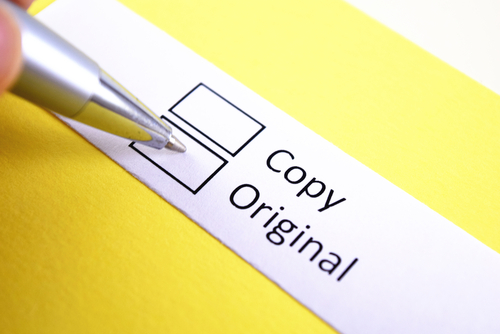
What makes search engines happy? Fresh, unique, and relevant content is at the top of their list. People worry about duplicate content on the internet. They're afraid that when Google crawls their website, it will penalize them if any content is slightly similar or identical to other content out there.
Matthew Cutts, the former head of Google’s webspam team, noted that up to 30% of what’s on the web is duplicate content. He should know; it was his responsibility to make sure content wasn’t spammy or trying to manipulate search results.
Cutts also tried to reassure everyone that their website wouldn’t be penalized for duplicate content. But on their support forum at Google.com, they offer links to the Digital Millennium Copyright Act and help on how to file a complaint about copyright infringement.
As a writer, the worst thing you can do is copy someone else’s work. Sometimes, though, whether we’ve researched topics for articles and made sloppy notes, or lost track of whether we've already submitted a ghost-written piece elsewhere, writers can accidentally get a little too close.
We can potentially forget to attribute someone else’s original ideas and content appropriately. That’s when the plagiarism check at ProWritingAid comes in handy.
What is plagiarism?
The dictionary says it’s "the practice of taking someone else’s work or ideas and passing them off as one’s own." Synonyms listed include, "copying, infringement of copyright, piracy, theft, stealing, and informal cribbing."
Whether you inadvertently use someone else’s idea or outright steal someone else’s work and lie about it later, it’s still the same result.
You’ve passed another person’s writing off as your own. Your reputation as a writer won’t recover from proof of plagiarism in your work.
How to ensure you don’t plagiarize
First, take a course on avoiding plagiarism. You can find one at a local college or university, or do a Google search and find an online version. You must understand exactly what plagiarism is before you can figure out how to avoid it.
If you want to get an in-depth education on plagiarism, see if you can find a law school course. They’re strict about the highest degree of professionalism and integrity in all writing.
Make sure you understand the consequences. Not just legally, but professionally, know what plagiarism does to you and others. Then invest in a good plagiarism checker like ProWritingAid’s and use it consistently.
There is no better method of avoiding plagiarism than proactively catching it before you publish or send your writing out there.
Especially if you’re a new writer on the internet scene, it’s your responsibility to make sure you know how to properly use and cite others’ work. These are your peers and others you look up to; make sure you show respect for their work. If it’s just not that important to you, you shouldn’t be a writer.
What to do if someone steals your work
A writer’s biggest fear is that someone will steal their ideas and get credit for it. Our ideas are important, right? So when an individual tries to pass off your ideas as their own, it not only hurts, but it diminishes your efforts and impact on the world. Here’s what you can do about it.
If someone else copies your work on the internet, you can petition Google to have it removed. Read more about the Digital Millennium Copyright Act. Plagiarism violates the law, and Google has a legal troubleshooter to help you report it. You can find it here.
When you can’t avoid duplicate content
Yes, there are situations when you can’t avoid duplicate content. For instance, I once wrote for a client who wanted copy for 70+ home improvement services that offered the same benefits and advantages.
The client wanted each service to have a separate landing page, so some content was the same between pages. For example, each service type offered the same emergency services option.
It’s good to know Google doesn’t penalize for this duplicate content. Their crawlers understand the difference between duplicate content and plagiarism. And Google will drop a website’s rank if it plagiarizes others’ content.
Most webmasters know how to avoid Google classifying unavoidable duplicate content as plagiarism, such as through "301 redirects" and canonical tags. It may behoove you as a writer to understand the difference as well.
Final thoughts
As a writer, it’s your responsibility to understand copyright. Don’t be a schmuck. If you’re paraphrasing someone else’s idea, give them credit. It’s not only the right thing to do, it’s your job as a writer to stand up for other writers.
You know how hard you work on your own stuff; our biggest fear is someone will steal our ideas. Don’t do that to someone else, even inadvertently.
Use ProWritingAid’s plagiarism check on everything you write for peace of mind knowing your work is your own.

